Hispanic voters could be decisive in Florida. But they're not a 'bloc' any longer.
Video Produced by Laura Ramirez
MIAMI — On a Monday afternoon in late February, Ana Maria Espino walked into a small storefront in Miami’s Little Havana neighborhood that housed a local office for Michael Bloomberg’s presidential campaign and announced that she wanted to volunteer.
Florida’s Democratic primary election was just three weeks away, and Espino, 66, was determined to do her part to ensure that Democrats nominated the candidate who, she believed, had the best chance of defeating Donald Trump in November.
“Our country needs somebody different and I’m very adamant about trying to help attain this,” Espino told Yahoo News. A native of Cuba who teaches English to adults in her adopted home of Miami, Espino described herself as a longtime Democrat — though she did vote for Republican President Ronald Reagan.
While other Democratic candidates were busy campaigning in states with earlier primary elections, Bloomberg, the billionaire former mayor of New York City, had been saturating Florida’s television and radio airwaves with millions of dollars’ worth of campaign ads for weeks.
Asked why she thought Bloomberg was the best person to take on Trump, Espino said, “I feel that he has a lot of experience in government and in business.
“Most of all,” she continued, “he’s not a socialist communist.”
Espino was referring to Vermont Sen. Bernie Sanders, the self-described democratic socialist who, just two days earlier, had emerged from the Nevada caucuses as the clear — albeit temporary — frontrunner in the still-crowded Democratic primary field.
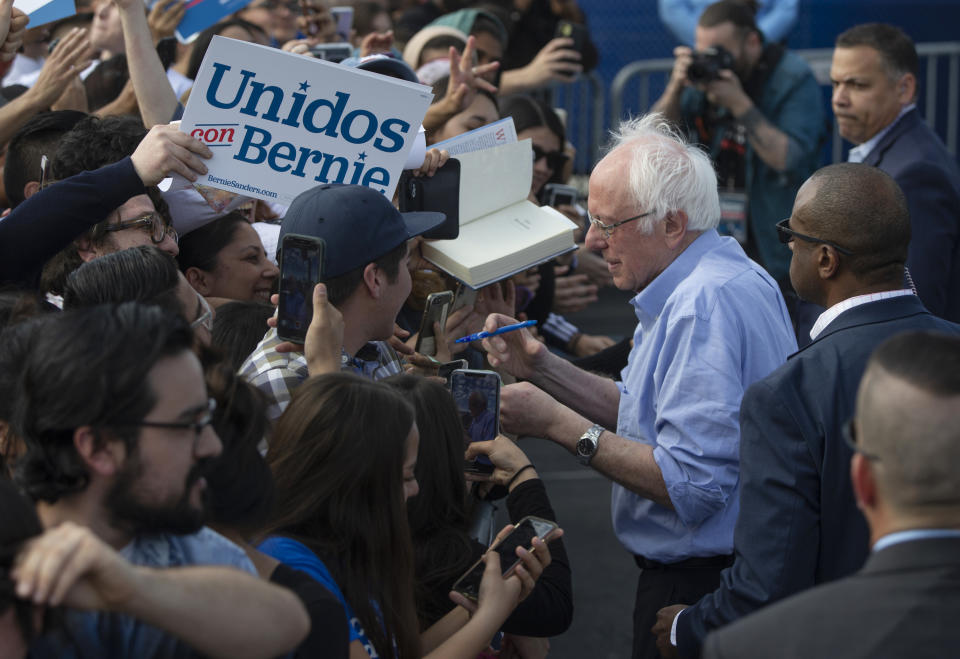
As it does for many Cuban exiles who call Florida home, the populist platform promoted by Sanders raises serious red flags for Espino, who was just 6 years old in 1960 when she and her family left home for Miami, one year after Fidel Castro took power. Just one night before Espino’s visit to the Bloomberg campaign office, Sanders seemed to validate those concerns by offering praise for Castro’s literacy program during an appearance on “60 Minutes.”
“There is clear evidence that Castro has done no good whatsoever in Cuba, and the people are the ones suffering,” said Espino. She dismissed claims that Sanders’s brand of democratic socialism is nothing like the repressive communism that has come to define the Castro regime.
“That’s how Castro started,” Espino said. “He was socialist and then communist. It’s all just very idealistic, and it just doesn’t work for the people.”
A lot has changed in the weeks since Espino first walked into the Bloomberg campaign office in Little Havana — not least Bloomberg’s ending his short-lived bid for the presidency following staggering Super Tuesday losses, and throwing his support behind former Vice President Joe Biden. Several other candidates have since followed suit, unexpectedly propelling Biden to the lead in what has become a two-person race with Sanders. Espino told Yahoo News via email last week that she too was following Bloomberg’s lead and backing Biden as well.
While support from Hispanic voters, particularly in Nevada and California, has proven to be crucial to Sanders’s initial success and more recent survival in the Democratic primaries, Latinos in Florida could ultimately help bring about his campaign’s demise.
According to the results of a recent Telemundo poll, 70 percent of likely Latino voters in Florida said they would not support a candidate who identifies as a “socialist.” Overall, the poll found that 48 percent of likely Latino voters in Florida prefer Biden compared to 37 percent for Sanders. In Arizona, where the Hispanic electorate is generally younger and more progressive, Telemundo’s poll found that Sanders led Biden among Latino voters 47-40 percent.
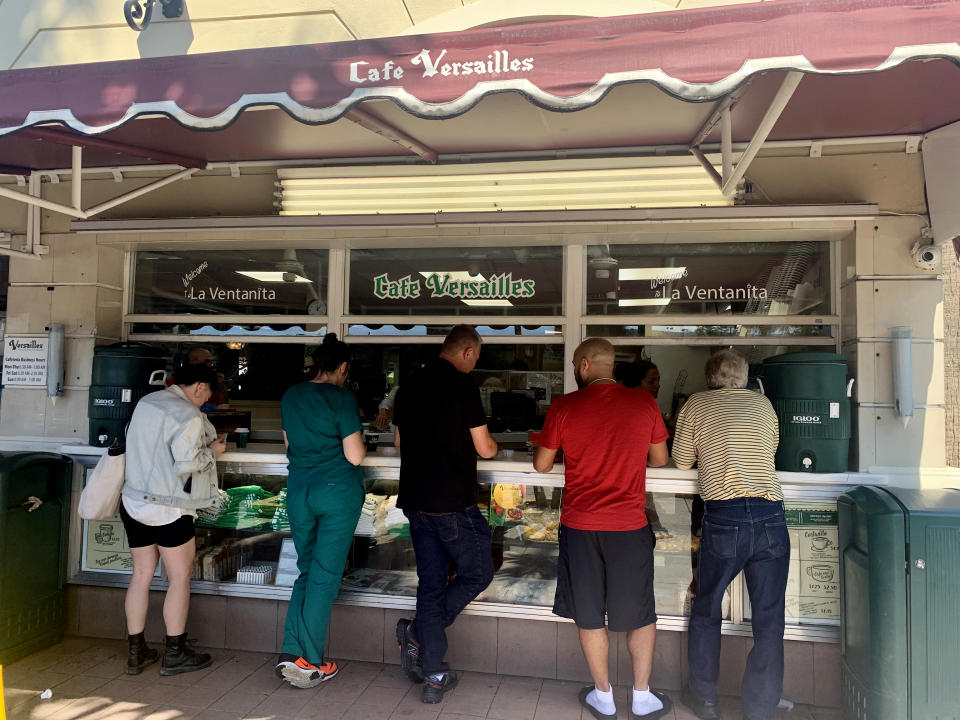
“One of the things we have to understand is that not all Hispanic voters are created equal,” said Fernand Amandi, a Miami-based pollster and Democratic strategist.
During an interview with Yahoo News at his office in Miami in February, Amandi explained how Florida’s Hispanic electorate has evolved over the last 20 years from “what used to be almost a monolithically Cuban-American vote. Virtually all Hispanic voters in the state were of Cuban-American origin.”
Now, he said, Latino voters in the state generally fall into one of three main categories: Cubans, who still make up about a third of the Hispanic electorate; Puerto Ricans, U.S. citizens who’ve flocked to Florida in large numbers over the past few years in response to crippling economic crisis and devastating natural disasters; and immigrants or first- and second-generation Americans from a variety of countries in Central and South America.
Amandi said that while these different cohorts are generally aligned on what they believe are the most important issues — “the economy, health care, immigration” — there are still certain “litmus test issues” that each community holds dear. For Cubans, as well as Venezuelans, Nicaraguans and others who fled socialist or communist dictatorships, that issue is U.S. policy toward those regimes.
For voters who fall into that category, Amandi said, Sanders’s identification with democratic socialism and his positive comments about Castro and other leftist Latin American regimes “might be a disqualifier,” even if he is otherwise seen as representing their interests.
“Bernie Sanders represents what used to be the caricature of the wide-eyed leftist, sympathetic to communists and socialists [that] was imprinted in the minds of a lot of voters here over the years,” said Amandi.
“Democrats worked very hard over the last 25 years to kind of mitigate those perceptions, and it actually led to tremendous success,” he said, noting that both Barack Obama and Hillary Clinton received over 40 percent of the Cuban vote in the last two presidential elections. Sanders’s candidacy, Amandi argued, could be “detrimental” to that success.
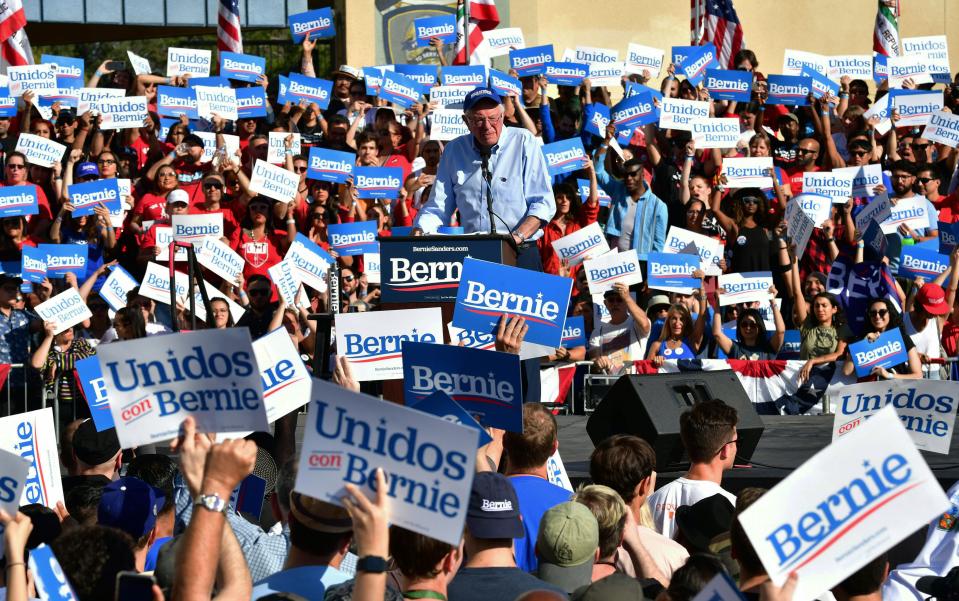
Andy Vila disagrees.
Vila, 21, was just 6 years old when he and his family emigrated from Cuba in 2004. Like many Cuban refugees in Miami, Vila said his parents felt embraced by the Republican Party in the United States, and as a teenager, he too identified as a conservative. He even worked as an intern for Ileana Ros-Lehtinen, the long-serving former Republican representative from Miami. But once he got to college, Vila, who is currently a student at Florida International University, began to question the staunchly conservative views he’d grown up with.
Now, Vila works as a team lead for the progressive Florida Immigrant Coalition’s voter registration program. Separately, he’s also an outspoken supporter of Sanders.
“As a Cuban immigrant, I think he has done an excellent job of dispelling whatever fears I might’ve had about his candidacy,” Vila told Yahoo News while canvassing in Miami in February. The Florida Immigrant Coalition, or FLIC, does not endorse any particular presidential candidate, but Vila said that based on his own conversations with prospective voters, he personally believes that Sanders’s platform appeals to many Latino voters in Miami, including Cubans.
“I think the most important thing to Latinos is health care. That’s what I’ve heard from people that I’ve spoken with,” he said. While Vila acknowledged that concerns about socialism exist particularly among the older generation of Cuban-Americans, he dismissed the idea that Sanders’s democratic socialist identity is a deal breaker for the entire Cuban community.
“I don’t think that really matters to most people,” he said, arguing that “recent Cuban migrants like myself” are more concerned about issues like climate change, student debt, housing and health care.
“I don’t think people are going to care so much about the label. I think they’re going to care more about the policies that you’re putting forward.”
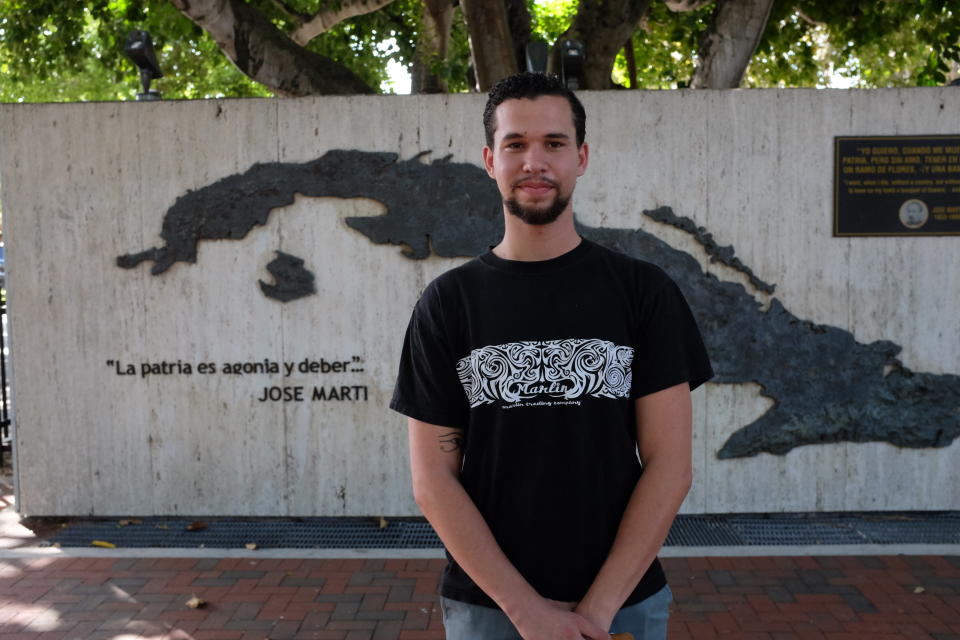
Republicans are hoping Vila is wrong about that.
Since 1992, no candidate from either party has won a presidential election in the United States without the support of the Sunshine State — including Trump, who narrowly won Florida in 2016 by 1.3 percentage points over Hillary Clinton. Latinos have always been an influential segment of Florida’s electorate, but their numbers have grown substantially over the last six years, largely thanks to an influx of U.S. citizens from Puerto Rico, the fastest-growing segment of the Latino voter population.
According to U.S. census data, between 2010 and 2017, the number of Puerto Ricans living in Florida grew by 30.5 percent to 1.1 million, becoming the second-largest group of Latinos in the state after Cubans. Migration from Puerto Rico further increased in the aftermath of Hurricane Maria in September 2017, which is estimated to have killed 2,975 people and caused more than roughly $100 billion in damage to the island. In 2018, the U.S. Census Bureau found that 36.9 percent more people moved from Puerto Rico to the mainland United States than during the previous year — with a third of them relocating to Florida.
Pew Research Center estimated that as of 2018, Puerto Ricans made up roughly one-third of all eligible Hispanic voters in Florida. However, it remains unclear exactly what role they’ll play in the 2020 election.
One poll released in October by the progressive group Equis Labs found that 73 percent of registered Puerto Rican voters in Florida surveyed said they disapproved of the way Trump has handled issues relating to Puerto Rico, including his administration’s response to Hurricane Maria. However, just 67 percent said they were “highly motivated '' to vote in the upcoming presidential election. Twenty-one percent of those surveyed said they would vote to reelect Trump, while 63 percent said they planned to back the Democratic nominee, and 16 percent were still undecided.
Voter turnout, particularly among Puerto Ricans, is a big concern for groups like Mi Familia Vota, a national civic engagement organization that has been focused on registering and mobilizing Latino voters ahead of the 2020 election.
“It’s one thing to register a person to vote,” said Wilfred Benitez, the Tampa Bay coordinator for Mi Familia Vota. Getting them to show up at the polls is another.
Benitez, who himself is Puerto Rican, spoke to Yahoo News at Mi Familia Vota’s offices in Orlando in February. He explained that in addition to registering new voters, the organization also works to educate recent Puerto Rican transplants on how U.S. elections work, and then convince people that voting is worth their time. Though Puerto Ricans are U.S. citizens, residents of the U.S. territory can vote only in presidential primaries, not general elections, and are represented by a nonvoting commissioner in Congress. This long-standing lack of representation has discouraged many from participating in the political process.
“Many blame those in political power for problems that caused them to leave Puerto Rico in the first place … but [they have an] ingrained belief that their vote doesn’t count,” said Benitez. “It’s a process you have to teach them. … Here, you need to participate, you need to engage in order to have a better quality of life.”
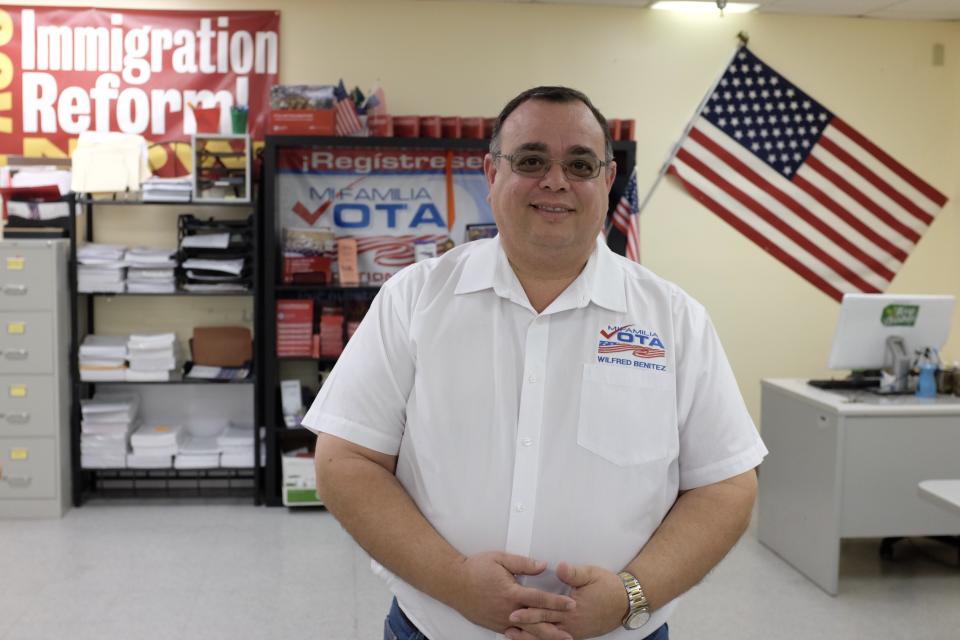
Earlier that day, that dissonance was on display outside an Orlando food bank where Benitez and other Mi Familia Vota staffers approached people with voter registration forms. Two women, both from Puerto Rico, expressed their frustrations with Trump as they filled out the forms, citing his immigration policies as well as his administration’s response to Hurricane Maria. However, when asked who they planned to vote for, neither woman named a candidate but instead said they weren’t sure whether they would vote at all.
The importance of Florida’s Latino vote has not been lost on the Trump campaign. While Democratic candidates, with the exception of Bloomberg, have done relatively little outreach in Florida so far, instead focusing much of their time and energy in states with earlier primaries, the Trump campaign has been aggressively courting Latino voters here since June 2019, when he officially launched his run for reelection at a rally in Orlando.
More than half of Cuban voters in Florida backed Trump in the last presidential election, reversing a sizable shift within that community toward the Democratic Party after decades of support for the GOP. But the Trump campaign has clearly recognized that it can’t rely on Cubans alone to win Florida in 2020.
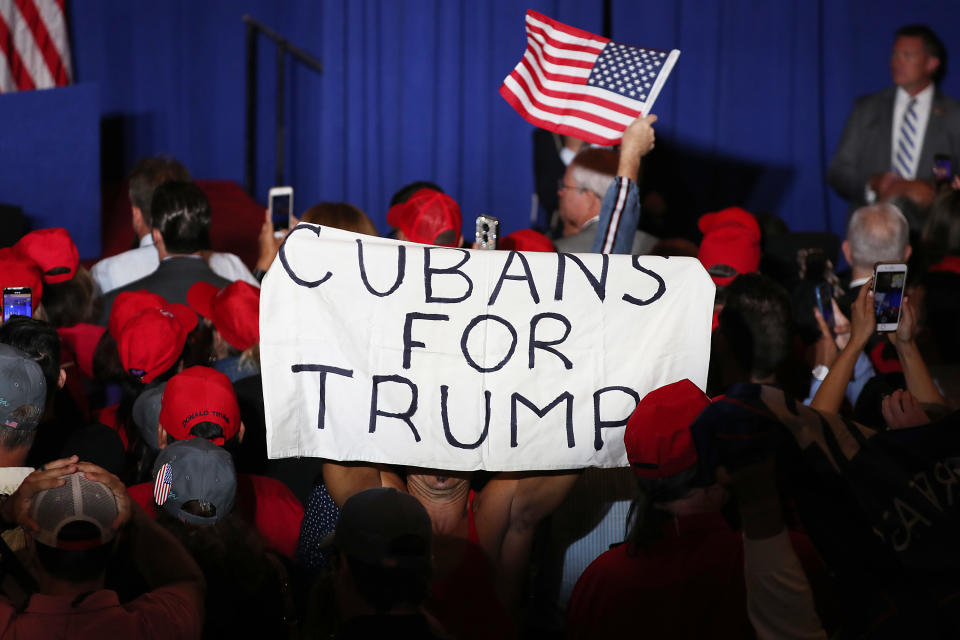
In speeches and campaign materials, Trump and his allies have sought to stoke the deep-seated concerns about socialism held not only by Cubans but also Venezuelans and Nicaraguans, by painting Democrats in general as “radical socialists” and promoting his administration’s so-far unsuccessful efforts to oust Venezuelan President Nicolás Maduro. His campaign is also targeting other segments of Florida’s growing and diverse Hispanic electorate, including evangelical Latinos and even Puerto Ricans. In January, Vice President Mike Pence spoke to a mostly Puerto Rican crowd at a “Latinos for Trump” event in Kissimmee, touting the major disaster declaration signed by Trump earlier that day to provide Puerto Rico with federal emergency funds to aid in the response to recent earthquakes.
“Our message to Puerto Rican Americans is this: We’re with you today. We’ll be with you tomorrow, and we’ll be with you until the day Puerto Rico rebuilds bigger and better than ever,” Pence said at the event.
Ultimately, Amandi argued, any Democrat who hopes to win Florida in November shouldn’t wait much longer to launch their own Latino outreach campaign in the state.
“What we’ve seen in Florida, and really throughout the country when it comes to the Hispanic vote, [is that] those who have a first-mover advantage, those who can get to the community early, define their candidacies, define themselves, have a tendency to do well, particularly when they’re doing it by themselves,” said Amandi. “Any segment of the Hispanic electorate in such a close state like Florida could potentially be decisive.”
_____
Read more from Yahoo News:



